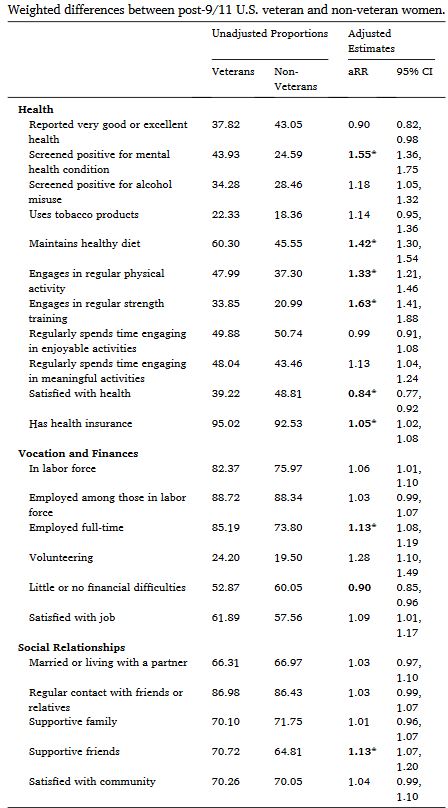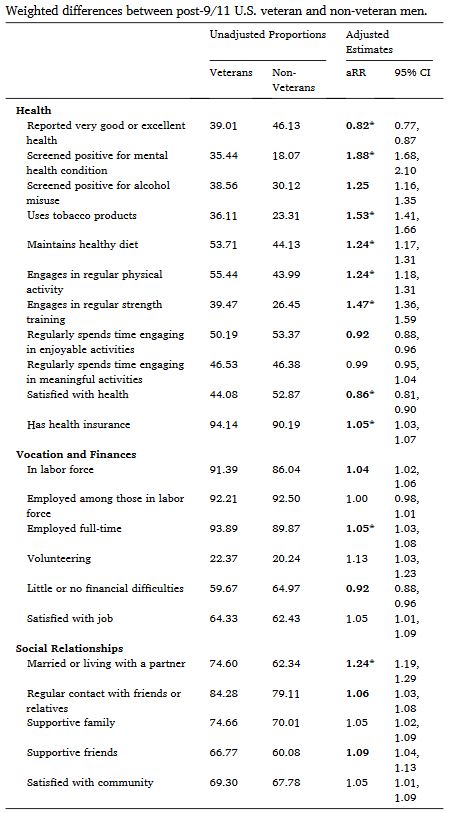BOSTON — Recent U.S. veterans reported similar or better outcomes than nonveterans when it comes to their health, vocational, financial and social well-being. That is in contrast to some earlier cohorts who had served in the military and lagged behind civilians in some domains.
The new study in the Social Science and Medicine—Population Health journal noted that post-9/11 veterans who answered a web-based survey appeared to have greater engagement in a range of positive health behaviors and better outcomes on some aspects of social well-being than nonveterans.“The finding that post-9/11 veterans reported greater engagement in some health-promoting behaviors is particularly interesting, given that this finding contrasts with research on the veteran population as a whole (including veterans who served before 9/11),” explained corresponding author Dawne S. Vogt, PhD, research scientist in the Women’s Health Sciences Division, National Center for PTSD at VA Boston Healthcare System and professor of psychiatry at Boston University School of Medicine.
The survey found that veterans reported poorer health status but more positive health behaviors, and had better social well-being by some measures.
The authors pointed out that their findings demonstrated the value of assessing multiple aspects of veterans’ health and well-being. It also could put to rest some inaccurate stereotypes about veterans, they added.

Click to Enlarge: Note. Proportions presented are unadjusted. Risk ratios (aRR) and 95% confidence intervals (95% C.I.) presented are adjusted for age and race/ethnicity. Bolded aRRs indicate statistical significance p < .002. aRR cut-offs for women varied from 1.02 to 1.31 (inverse: 0.76 to 0.97), and aRRs that met the threshold for at least a small effect are specified with an asterisk. Sample size varied from 4,860 to 6,887. Source: SSM – Population Health
Background information in the study noted that, while prior research has examined how the post-military health and well-being of both the larger veteran population and earlier veteran cohorts differs from nonveterans, that had not been done with the newest cohort of veterans. “This is a significant oversight, as accurate knowledge of the strengths and vulnerabilities of post-9/11 veterans is required to ensure that the needs of this population are adequately addressed, as well as to counter inaccurate veteran stereotypes,” the authors wrote.
Responding to the confidential survey in 2018 were 15,160 post-9/11 U.S. veterans and 4,533 nonveterans.
Results indicated that, even though both men and women post-9/11 veterans reported poorer health status than nonveterans, they also described greater engagement healthy eating and exercise; they also were more likely to indicate having access to healthcare. Although social well-being was better in veterans, few differences were found in vocational and financial well-being. “Despite their greater vulnerability to experiencing health conditions, the newest generation of post-9/11 U.S. veterans report experiencing similar or better outcomes than non-veterans in many aspects of their lives,” Vogt noted in a press release. “These findings underscore the value of examining a wider range of health and well-being outcomes in veteran research and highlight a number of important directions for intervention, public health education, policy and research related to the reintegration of military veterans within broader civilian society.”

Click to Enlarge: Note. Proportions presented are unadjusted. Risk ratios (aRR) and 95% confidence intervals (95% C.I.) presented are adjusted for age and race/ethnicity. Bolded aRRs indicate statistical significance p < .002. aRR cut-offs varied from 1.03 to 1.32 (inverse: 0.76 to 0.97), and aRRs that met the threshold for at least a small effect are specified with an asterisk. Sample size varied from 10,007 to 12,303. Source: SSM – Population Health
The researchers said they were not surprised that post-9/11 veterans reported poorer health status than their peers, because of potential exposure to health risks in the military, but they emphasized the need for continued investment in the provision of high-quality healthcare in both the VA and community-based health-care settings.
Health Promoting Behaviors
“Given that post-9/11 veterans reported greater engagement in some health-promoting behaviors than their nonveteran peers (diet, physical activity and strength training), these efforts should also focus on preventing declines in veterans’ engagement in health-promoting behaviors as they move through their life course,” Vogt pointed out. The authors also called for more focus on veterans’ strengths, as well as their vulnerabilities, when it comes to research and public education.
The recent survey is in stark contrast to prior studies, which have found veterans were likely to engage in behaviors risky to their health.
A study last year from Texas State University in San Marcos blamed a greater burden on military personal for putting them at risk for health conditions. “The physical demands on U.S. servicemembers have increased significantly over the past several decades as the number of military operations requiring overseas deployment have expanded in frequency, duration and intensity,” the authors wrote. “These elevated demands from military operations placed upon a small subset of the population may be resulting in a group of individuals more at-risk for a variety of debilitating health conditions.”2
The study derived its findings from the national Centers for Disease Control and Prevention (CDC) Behavioral Risk Factor Surveillance System (BRFSS) dataset to examine 10 different self-reported morbidities in veterans vs. nonveterans from 2003-2019.
Analysis indicated that veterans have disproportionately higher self-reported rates of overweight/obesity, stroke, skin cancer, cancer, COPD, arthritis, kidney disease and diabetes.
“These data present an overall poor state of the health of the average U.S. veteran,” the authors wrote, adding, “Our study findings suggest that when taken as a whole, these morbidities among veterans could prompt the U.S. Department of Veteran Affairs (VA) to help develop more effective health interventions aimed at improving the overall health of the veterans.”
Previous studies have documented that veterans are more likely to smoke and engage in risky drinking than their nonveteran counterparts, according to the more-recent article.
Research last year from the VA Puget Sound Health Care System also determined that veterans had less access to social support, noting, “After accounting for factors that influence military entry and social support, veterans reported significantly lower structural social support, which may be attributable to reintegration challenges and geographic mobility. Findings suggest that veterans could benefit from programs to enhance structural social support and improve heath outcomes, with female veterans potentially in greatest need.”3
- Vogt D., Borowski S., Maguen S., Blosnich J.R., Hoffmire C.A., Bernhard P.A., Iverson K.M. & Schneiderman A., Strengths and vulnerabilities: Comparing post-9/11 U.S. veterans’ and non-veterans’ perceptions of health and broader well-being, SSM – Population Health (2022), doi: https:// doi.org/10.10
- Betancourt JA, Granados PS, Pacheco GJ, Reagan J, Shanmugam R, Topinka JB, Beauvais BM, Ramamonjiarivelo ZH, Fulton LV. Exploring Health Outcomes for U.S. Veterans Compared to Non-Veterans from 2003 to 2019. Healthcare (Basel). 2021 May 18;9(5):604. doi: 10.3390/healthcare9050604. PMID: 34070037; PMCID: PMC8158130.
- Campbell SB, Gray KE, Hoerster KD, Fortney JC, Simpson TL. Differences in functional and structural social support among female and male veterans and civilians. Soc Psychiatry Psychiatr Epidemiol. 2021 Mar;56(3):375-386. doi: 10.1007/s00127-020-01862-4. Epub 2020 Apr 6. PMID: 32249329; PMCID: PMC8687626.
